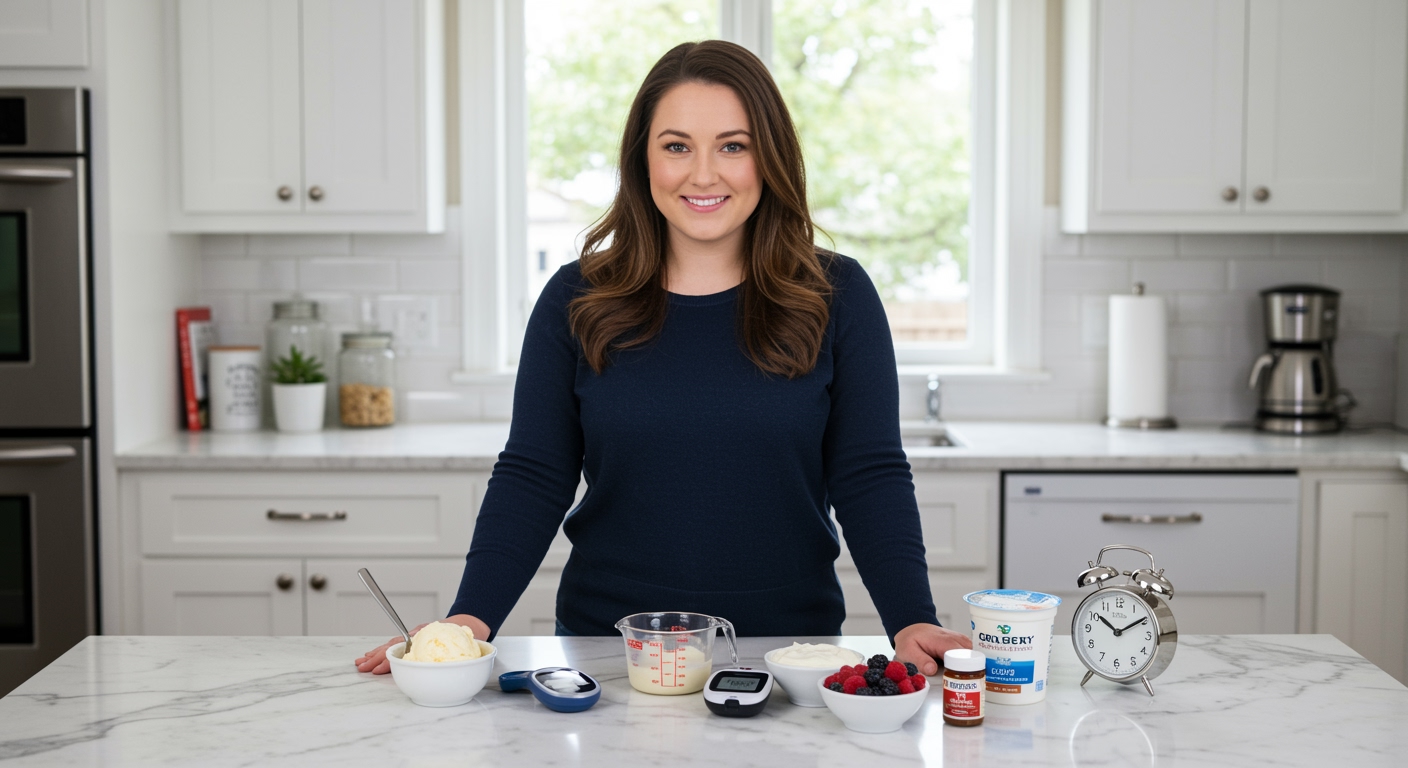✪ Key Takeaway: Ice cream is not inherently bad for PCOS when consumed in small portions with protein or fiber to minimize insulin spikes.
Introduction
You stare at that pint of ice cream in your freezer and wonder if one scoop will sabotage your PCOS management efforts.
Many women with PCOS believe they must completely eliminate ice cream and other desserts to manage their symptoms effectively.
Hi, I am Abdur, your nutrition coach and today I am going to explain why ice cream does not have to be your enemy when you have PCOS.
What Makes Ice Cream Problematic For PCOS?
Ice cream contains high amounts of sugar and saturated fat that can trigger insulin resistance in women with PCOS.
A typical half-cup serving of premium ice cream contains 15-20 grams of sugar, which causes rapid blood glucose spikes.
Your pancreas responds by releasing large amounts of insulin to bring blood sugar levels back down.
Women with PCOS already struggle with insulin resistance, meaning their cells do not respond properly to insulin signals.
This creates a vicious cycle where excess insulin promotes fat storage and increases androgen production.
Higher androgen levels worsen PCOS symptoms like irregular periods, acne, and unwanted hair growth.
✪ Fact: Women with PCOS have 50-70% higher insulin levels than women without the condition.
Does Timing Matter When Eating Ice Cream?
Timing plays a crucial role in how your body processes ice cream when you have PCOS.
Your insulin sensitivity is naturally higher in the morning and decreases throughout the day.
Eating ice cream earlier in the day allows your body to process the sugar more efficiently.
Post-workout timing can be particularly beneficial because exercise increases insulin sensitivity for several hours.
Your muscles actively take up glucose without requiring as much insulin during this window.
Avoiding ice cream late at night prevents blood sugar spikes when your metabolism is naturally slower.
✪ Pro Tip: Consume ice cream within 2 hours after strength training for optimal glucose utilization.
How Can You Make Ice Cream PCOS-Friendly?
Portion control is your most powerful tool for enjoying ice cream without derailing your PCOS management.
Stick to a half-cup serving instead of eating directly from the container.
Add protein sources like nuts, seeds, or Greek yogurt to slow down sugar absorption.
The protein creates a buffer effect that prevents rapid blood glucose spikes.
Choose ice cream varieties with higher fat content as fat also slows sugar absorption.
Consider adding cinnamon, which has been shown to improve insulin sensitivity in women with PCOS.
Fresh berries provide fiber and antioxidants that further moderate the glycemic response.
✪ Note: Adding 1-2 tablespoons of chopped almonds can reduce ice cream’s glycemic impact by 25%.
What Are Better Ice Cream Alternatives?
Frozen yogurt with live cultures provides probiotics that may help improve insulin sensitivity.
Look for varieties with lower sugar content and higher protein compared to traditional ice cream.
Coconut-based ice creams often contain medium-chain triglycerides that are metabolized differently than other fats.
These MCTs are less likely to promote insulin resistance compared to the saturated fats in dairy ice cream.
Homemade frozen banana ice cream gives you complete control over ingredients and sugar content.
You can add protein powder, healthy fats, and natural sweeteners to create a PCOS-friendly dessert.
✪ Pro Tip: Blend frozen bananas with almond butter and a pinch of stevia for instant healthy ice cream.
Should You Track Your Response To Ice Cream?
Individual responses to ice cream vary significantly among women with PCOS.
Some women experience minimal symptoms while others notice immediate effects on energy and cravings.
Keep a food diary noting how you feel 1-2 hours after eating ice cream.
Pay attention to energy crashes, increased hunger, or mood changes that might indicate blood sugar instability.
Consider using a continuous glucose monitor if you want precise data about your blood sugar response.
This information helps you determine your personal tolerance and optimal serving size.
✪ Fact: Blood glucose responses to the same food can vary by 300% between individuals.
The Bottom Line
Ice cream does not have to be completely off-limits when you have PCOS if you approach it strategically with proper portions and smart timing.
Perfection is not the goal, progress is and learning to enjoy treats in moderation supports long-term success better than complete restriction.
I would love to hear about your experiences with ice cream and PCOS management, so please share your thoughts or questions in the comments below.
References
At NutritionCrown, we use quality and credible sources to ensure our content is accurate and trustworthy. Below are the sources referenced in writing this article:
- Smart Fertility Choices: PCOS Friendly Ice Cream
- PCOS Nutrition: Ice Cream and PCOS
- PMC: Polycystic Ovary Syndrome Diet
- Royal Berkshire NHS: PCOS Dietary Advice





